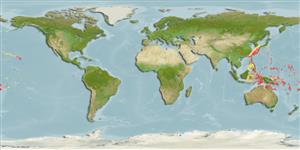Environment: milieu / climate zone / depth range / distribution range
Ecologia
marinhas demersal; não migratória; intervalo de profundidade 80 - 250 m (Ref. 5222). Deep-water; 36°N - 18°S, 117°E - 147°W (Ref. 5222)
Pacific Ocean: southern Japan, Taiwan, Guam, Philippines, South China Sea, Samoa, and Tahiti in French Polynesia. Reported from Fiji and Tuvalu (Ref. 12690).
Tamanho / Peso / Idade
Maturity: Lm ? range ? - ? cm
Max length : 43.0 cm TL macho/indeterminado; (Ref. 5222); common length : 25.0 cm TL macho/indeterminado; (Ref. 9137)
Espinhos dorsais (total) : 9; Raios dorsais moles (total) : 14; Espinhos anais: 3; Raios anais moles: 9. Distinguished by having the following characteristics: body depth 2.0-2.4 in SL; body width 2.3-2.6 in depth; caudal peduncle depth equal to or greater than length; head length 2.3-2.5 in SL; dorsal head profile straight or slightly concave to above eye, nape markedly convex; flat interorbital area; rounded preopercle, finely serrate, ventral serrae slightly enlarged, lower edge irregular but hidden by skin; subopercle and interopercle finely serrate; distinctly convex upper edge of operculum; maxilla naked, reaching vertical at rear edge of eye, prominent knob on ventral rear corner; ctenoid body scales, without auxiliaries (Ref. 089707).
A rare species found in deep waters, a specimen was caught at 250 m from Tahiti, French Polynesia. Feeds on fishes and crustaceans (Ref. 089707).
Life cycle and mating behavior
Maturidade | Reprodução | Desova | Ovos | Fecundidade | Larvas
Heemstra, P.C. and J.E. Randall, 1993. FAO Species Catalogue. Vol. 16. Groupers of the world (family Serranidae, subfamily Epinephelinae). An annotated and illustrated catalogue of the grouper, rockcod, hind, coral grouper and lyretail species known to date. Rome: FAO. FAO Fish. Synop. 125(16):382 p. (Ref. 5222)
Categoria na Lista Vermelha da IUCN (Ref. 130435: Version 2024-2)
Ameaça para o homem
Harmless
Utilização humana
Pescarias: pescarias de subsistência; peixe desportivo: sim
Ferramentas
Relatórios especiais
Descarregue XML
Fontes da internet
Estimates based on models
Preferred temperature (Ref.
123201): 18.3 - 26.5, mean 21.3 °C (based on 64 cells).
Phylogenetic diversity index (Ref.
82804): PD
50 = 0.5000 [Uniqueness, from 0.5 = low to 2.0 = high].
Bayesian length-weight: a=0.01549 (0.00909 - 0.02638), b=3.02 (2.88 - 3.16), in cm total length, based on LWR estimates for this species & Genus-body shape (Ref.
93245).
Nível Trófico (Ref.
69278): 4.0 ±0.66 se; based on food items.
Resiliência (Ref.
120179): Médio, tempo mínimo de duplicação da população 1,4 - 4,4 anos (Preliminary K or Fecundity.).
Fishing Vulnerability (Ref.
59153): Low to moderate vulnerability (33 of 100).
Nutrients (Ref.
124155): Calcium = 36.9 [16.4, 105.4] mg/100g; Iron = 0.481 [0.140, 1.235] mg/100g; Protein = 17.6 [15.7, 19.4] %; Omega3 = 0.453 [0.203, 0.989] g/100g; Selenium = 18.5 [5.3, 51.5] μg/100g; VitaminA = 9.64 [1.94, 49.69] μg/100g; Zinc = 0.311 [0.184, 0.564] mg/100g (wet weight);
